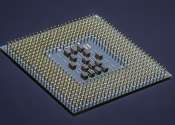Taiwan tech sector hit by coronavirus outbreak
A leading Taiwanese chip testing and packaging company said Monday that all its migrant employees have been suspended from working for around two weeks to contain a coronavirus outbreak.
Jun 7, 2021
0
3
Business

A leading Taiwanese chip testing and packaging company said Monday that all its migrant employees have been suspended from working for around two weeks to contain a coronavirus outbreak.
Jun 7, 2021
0
3
Automotive

Nissan says its huge factory in Smyrna, Tennessee, will close for two weeks starting Monday due to computer chip shortages brought on by a coronavirus outbreak in Malaysia.
Aug 10, 2021
0
3
Business

An effort to add bipartisan tax incentives for U.S. semiconductor manufacturing to a larger economic competitiveness package is running into divisions among House Republicans.
May 17, 2022
0
9
Business

Samsung Electronics' net profits surged more than 70 percent in the second quarter thanks to higher memory chip prices fuelled by pandemic-led demand, the South Korean tech giant reported Thursday.
Jul 29, 2021
0
95
Automotive

India's Tata Motors reported its third straight quarter of losses on Monday as chip shortages and rising raw material prices hit the automaker's bottom line.
Nov 1, 2021
0
5
Electronics & Semiconductors

The United States plans to award giant chipmaker GlobalFoundries $1.5 billion in direct funding to boost domestic chip production, the Commerce Department said on Monday.
Feb 19, 2024
0
1
Business

Ohio's largest-ever economic development project comes with a big employment challenge: how to find 7,000 construction workers in an already booming building environment when there's also a national shortage of people working ...
Aug 22, 2022
0
5
Business

Taiwan is ramping up testing and vaccinations for tech industry workers in a bid to stop a sudden surge in coronavirus cases hitting its semiconductor industry at a time of global shortages.
Jun 3, 2021
0
2
Electronics & Semiconductors

Japanese chipmaker Renesas Electronics said Monday it was on track to restore full capacity by May after a plant fire, as manufacturers around the world battle to secure semiconductor supplies.
Apr 19, 2021
0
5
Business

The European Commission said Thursday that it could approve aid to fund production of semiconductors in the 27-nation bloc amid a global chip shortage and intense worldwide competition to fill the need.
Nov 18, 2021
0
8
A semiconductor is a material that has a resistivity value between that of a conductor and an insulator. The conductivity of a semiconductor material can be varied under an external electrical field. Devices made from semiconductor materials are the foundation of modern electronics, including radio, computers, telephones, and many other devices. Semiconductor devices include the transistor, solar cells, many kinds of diodes including the light-emitting diode, the silicon controlled rectifier, and digital and analog integrated circuits. Solar photovoltaic panels are large semiconductor devices that directly convert light energy into electrical energy. In a metallic conductor, current is carried by the flow of electrons. In semiconductors, current can be carried either by the flow of electrons or by the flow of positively-charged "holes" in the electron structure of the material.
Silicon is used to create most semiconductors commercially. Dozens of other materials are used, including germanium, gallium arsenide, and silicon carbide. A pure semiconductor is often called an “intrinsic” semiconductor. The conductivity, or ability to conduct, of semiconductor material can be drastically changed by adding other elements, called “impurities” to the melted intrinsic material and then allowing the melt to solidify into a new and different crystal. This process is called "doping".
This text uses material from Wikipedia, licensed under CC BY-SA